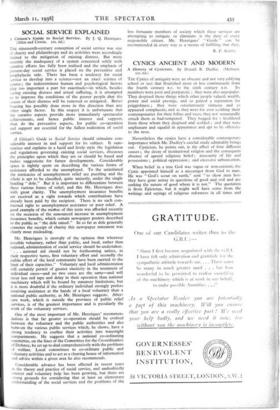SOCIAL SERVICE EXPLAINED A Citizen's Guide to Social Service. By
J. Q. Henriques. (Allen and Unwin. ros. 6d.) THE nineteenth-century conception of social service was one of charity and philanthropy and its activities were accordingly limited to the mitigation of existing distress. But more recently the inadequacy of a system concerned solely with curative efforts has fully been realised and the emphasis of present-day social service is placed on the preventive and prophylactic side. There has been a tendency for social service to develop into a science—not an exact science of course ; the indeterminate human and psychological factors play too important a part for exactitude—in which, besides curing existing distress and actual suffering, it is attempted so to improve the conditions of the poorer people that the causes of their distress will be removed or mitigated. Better housing has possibly done more in this direction than any other single factor. In this respect it is unfortunate that the curative aspects provide more immediately spectacular achievements, and hence public interest and support, than do the preventive aspects, for public co-operation and support are essential for the fullest realisation of social service.
A Citizen's Guide to Social Service should stimulate con- siderable interest in and support for its subject. It sum- marises and explains in a lucid and lively style the legislation and regulations governing existing social services, discusses the principles upon which they are or should be based and makes suggestions for future developments. Considerable space is rightly spent on describing the various forms of assistance afforded to the unemployed. To the uninitiated the intricacies of unemployment relief are puzzling and the whole is apt to be classified, quite unjustly, under the single heading " dole." But it is important to differentiate between these various forms of relief, and this Mr. Henriques does with great clarity. The unemployment insurance benefits are received as a right towards which contributions have already been paid by the recipient. There is no such con- tractual right to unemployment assistance or poor relief. A good example of the misise of this term was afforded recently on the occasion of the announced increase in unemployment insurance benefits, which certain newspaper posters described to the public as " the dole raised." In so far as dole generally connotes the receipt of charity this newspaper statement was clearly most misleading.
Mr. Henriques is strongly of the opinion that wherever possible voluntary, rather than public, and local, rather than national, administration of social service should be undertaken. " . . national aid should not be forthcoming unless, in their respective turns, first voluntary effort and secondly the public effort of the local community have been exerted to the limit of their capacities." Voluntary and local administration will certainly permit of greater elasticity in the treatment of individual cases—and no two cases are the same—and will incur less red tape and delay in their operation than national machinery which will be bound by statutory limitations, but it is more doubtful if the ordinary individual strongly prefers receiving assistance at the hands of a local voluntary than a national public authority, as Mr. Henriques suggests. After- care work, which is outside the province of public relief services, is of the greatest importance and is peculiarly the work of the voluntary services.
One of the most important of Mr. Henriques' recommen- dations is that far greater co-operation should be evolved between the voluntary and the public authorities and also between the various public services which, he shows, have a strong tendency to confine their activities into watertight compartments. He suggests that a national co-ordinating committee, on the lines of the Committee for the Co-ordination of Defence, be set up to deal comprehensively with the problems of welfare. Local committees to co-ordinate public and voluntary activities and to act as a clearing house of information and advice within a given area he also recommends.
Considerable advance has been effected in recent years in the theory and practice of social service, and undoubtedly Interest and voluntary help has been growing, but there are strong grounds for considering that at least an elementary understanding of the social services and the problems of the
less fortunate members of society which these services are attempting to mitigate or eliminate is the duty of every responsible citizen. Mr. Henriques' " Guide " can be recommended in every way as a means of fulfilling that duty.
R. F. SCOTT.










































 Previous page
Previous page